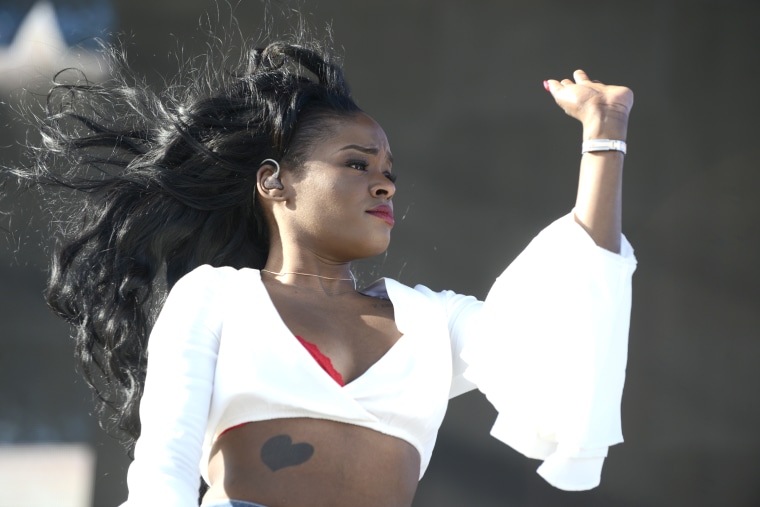Rapper Azealia Banks has largely distinguished herself in the public's consciousness with her myriad of social media beefs with other celebrities, and this week she has been the source of more controversy over her apparent use of skin lightening products.
Banks, who has taken other black stars to task in the past for the alleged lack of authenticity, has defended her actions, saying on a Facebook livestream: "I think that, just as African-American people, just as black people in this world, you assimilate, and there are things you accept, not just out of necessity but things become norm because they just happen all the time."
"I guess people see the skin-bleaching thing as something different but I see it as another ... assimilation thing. It's a continuation of the falsification of self that comes with being a black person in America," she added.
The 25-year-old performer is known for taking positions that are far outside the mainstream in the African-American community. For instance, she is one of the few hip-hop artists to enthusiastically endorse Donald Trump's presidential campaign, although at first she said she was doing so because [sic] "I only trust this country to be what it is: full of s***. takes s*** to know s***so we may as well, put a piece of s*** in the White House." She added: "I think Donald trump is evil like America is evil and in order for America to keep up with itself it needs him."
Later, she argued more lucidly: "I think Trump is the only one who truly has the ba**s to bust up big business." But her position on skin-lightening, as far as some African-Americans are concerned, is beyond the pale.

"I don’t know if she can’t afford a publicist but she should not be allowed to speak on her own behalf. She's like the female Chris Brown at this point," quipped black comedian and video blogger Marie Faustin in an interview with NBC News on Wednesday. "Everything that she says about this being a part of black culture is BS."
As a black woman in the entertainment industry, Faustin is constantly being confronted with a beauty standard largely established and perpetuated by white males, and from her perspective Banks and other women who are deliberately altering their appearance are doing a disservice to people of color who are trying to be comfortable with their own unique physical identities.
"It is a form of self-hatred, and it's kind of depressing," she said. "If I ever changed my nose, my mother would break it."
Still, Banks is far from the first black celebrity to be publicly shamed for appearing to indulge in skin-bleaching or skin-lightening cosmetics. Former baseball slugger Sammy Sosa, rapper Lil Kim and Dancehall star Vybz Kartel have all been pilloried for dramatic changes in their skin tone. And even pop star Beyoncé has been subjected to allegations that she's manipulated her complexion to appeal to a white audience.
"I can understand the pressures of Hollywood ... but it's still a horrible message because there are so many young women that look up to these artists and you're telling them indirectly that who they are isn't OK," David A. Wilson, the founder and editor-in-chief of the African-American news website theGrio, told NBC News on Thursday. "This is also contradictory to [Banks'] whole brand brand as a conscious, unwavering and unapologetic black woman."
Speaking of brands, skin-lightening products are big business -- especially internationally, where in places like the Caribbean and India, problematic notions about colorism still persist and average citizens used creams that have been determined to pose a serious threat to the health of the people that use them. The fact that famous figures with some degree of stature in their own community would risk their own safety to achieve a kind of racialized ideal, is troubling to say the least.
Related: Jermaine Jackson Blasts Trump as a 'Fool' for Michael Jackson Comments
The late pop music icon Michael Jackson was arguably the first black star to force the issue with his extreme physical metamorphosis in the last few decades that preceded his death. His repeated protestations that his increasingly fair skin was a result of the disease vitiligo were eventually validated by the autopsy following his death in 2009.
"People don't talk about it much now because he's passed away, but he did receive some notoriety. He was clowned for it and was the butt of jokes for it," Wilson pointed out.
Today, in the age of #BlackLivesMatter, #MelaninMonday, #BlackGirlMagic and other memes celebrating not just authentic African-American culture, but "non-traditional" beauty as well, Wilson believes that Banks' defense of skin-bleaching seems "completely out of step" with the current mood of black America.
"I think [Banks] could be a more effective spokesperson for the black cause if she didn't try to go for shocking people," he said. "People have lost a certain level of patience with her ... she's more famous for her tweets than she is for her music. At some point you're going to have prove why you're famous."
"She wants to be Iggy Azalea so bad at this point. You can be a dark-skinned girl and still be successful looking like yourself," added Faustin, citing Jill Scott and Kerry Washington as examples. "People who are truly comfortable with themselves, they remain that way throughout their career."